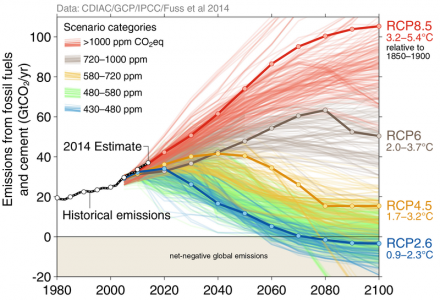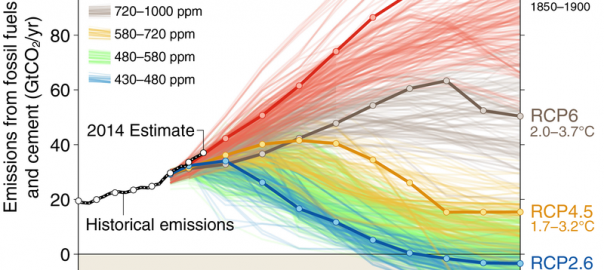There has always been an odd tenor to discussions among climate scientists, policy wonks, and politicians, a passive-aggressive quality, and I think it can be traced to the fact that everyone involved has to dance around the obvious truth, at risk of losing their status and influence.
The obvious truth about global warming is this: barring miracles, humanity is in for some awful shit.
Here is a plotting of dozens of climate modeling scenarios out to 2100, from the IPCC:

The black line is carbon emissions to date. The red line is the status quo — a projection of where emissions will go if no new substantial policy is passed to restrain greenhouse gas emissions.
Related 6 reasons conservatives should take climate change seriously
We recently passed 400 parts per million of CO2 in the atmosphere; the status quo will take us up to 1,000 ppm, raising global average temperature (from a pre-industrial baseline) between 3.2 and 5.4 degrees Celsius.
That will mean, according to a 2012 World Bank report, “extreme heat-waves, declining global food stocks, loss of ecosystems and biodiversity, and life-threatening sea level rise,” the effects of which will be “tilted against many of the world’s poorest regions,” stalling or reversing decades of development work.
“A 4°C warmer world can, and must be, avoided,” said the World Bank president.
But that’s where we’re headed. It will take enormous effort just to avoid that fate. Holding temperature down under 2°C — the widely agreed upon target — would require an utterly unprecedented level of global mobilization and coordination, sustained over decades. There’s no sign of that happening, or reason to think it’s plausible anytime soon. And so, awful shit it is.
Nobody wants to say that. Why not? It might seem obvious — no one wants to hear it! — but there’s a bit more to it than that. We’ll return to the question in a minute, but first let’s look at how this unsatisfying debate plays out in public.
Read more: Vox
